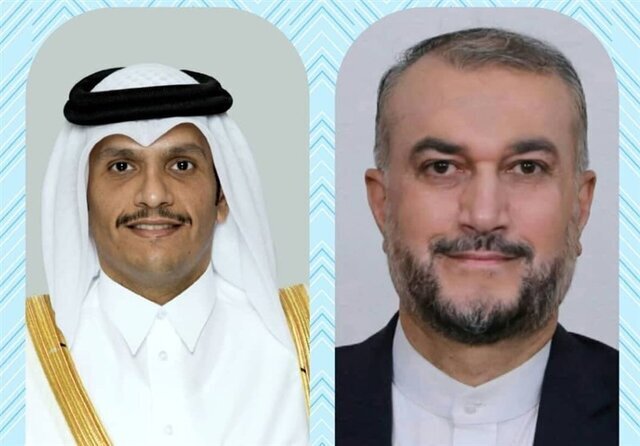Qatari and Iranian foreign ministers share views on Vienna talks

TEHRAN – The chief diplomats of Iran and Qatar on Saturday discussed over the phone a number of issues including the latest developments in talks in Vienna over reviving the 2015 Iran nuclear deal.
Qatar’s Deputy Prime Minister and Minister of Foreign Affairs Sheikh Abdul Rahman Al Thani and Iran’s Foreign Minister Hossein Amir Abdollahian also held talks over latest bilateral and regional developments, according to the Iranian Foreign Ministry.
In the phone call, the foreign ministers underlined the necessity of seriously pursuing the agreements reached by the two countries at the Iranian president’s recent meeting with the Qatari emir in Doha.
Regarding the Vienna talks, Amir Abdollahian criticized the U.S. for raising new issues and underscored that the Islamic Republic of Iran keeps making efforts to reach a good, robust and lasting deal.
During the conversation, Qatar’s top diplomat also stressed the importance of the Tehran-Doha relations and also the positive results of the recent visit by Iranian President Ebrahim Raisi to Qatar. He said efforts by Iran and other parties to the Vienna talks to reach a deal are important.
The Qatari Foreign Ministry also said in a statement that the two foreign ministers reviewed the situation around the Iran nuclear deal, officially known as the Joint Comprehensive Plan of Action (JCPOA).
After his conversation with Amir Abdollahian, Sheikh Abdul Rahman called U.S. Secretary of State Antony Blinken.
“The call dealt with reviewing strong bilateral ties between the State of Qatar and the United States, and the means to enhance them in different fields. The call also dealt with the latest developments of the Ukrainian-Russian crisis, nuclear talks, as well as developments in Afghanistan's security and political fields. They also exchanged views on a number of regional and international issues of joint interest,” the Qatari Foreign Ministry said of the second call.
Bloomberg reported on Sunday that the Qatari foreign minister was to travel to Moscow on Sunday after talks to revive the Iran nuclear deal stalled.
Al Thani planned to meet with his Russian counterpart Sergei Lavrov, a person with knowledge of the matter said. He could also potentially meet with Russian President Vladimir Putin, the person added, asking not to be identified.
The visit comes as Qatar works to salvage the Iranian nuclear talks, according to Bloomberg.
The possible visit comes as the Europeans are blaming Russia for pause in the Vienna talks.
Talks in Vienna over reviving the 2015 nuclear deal came to a halt right before the last outstanding issues were supposed to be addressed in order to close the much-awaited deal.
The European Union foreign policy chief, Josep Borrell, said that the pause was due to “external factors” which he refused to specify. “A pause in #ViennaTalks is needed, due to external factors. A final text is essentially ready and on the table. As coordinator, I will, with my team, continue to be in touch with all #JCPOA participants and the U.S. to overcome the current situation and to close the agreement,” Borrell said on Twitter.
France, Germany, and the UK -collectively known as the E3- made it clear what “external factors” mean. After implicitly accusing Russia of presenting “extraneous” conditions on March 8, the E3 pointed the finger of blame squarely at Russia on Saturday, warning of the collapse of the Vienna talks if Russia continued to insist on guarantees it is now demanding to shield its economic cooperation with Iran from Western sanctions over Ukraine.
“Nobody should seek to exploit JCPOA negotiations to obtain assurances that are separate to the JCPOA,” the E3 said in a joint statement. “This risks the collapse of the deal.”
The European backlash came after Russia said it needed guarantees that sanctions being slapped on Moscow by the West over the war in Ukraine won’t impede Russia’s cooperation with Iran in all fields.
Russian Foreign Minister Sergey Lavrov said on March 5, “We need guarantees that sanctions [over Ukraine] will not affect in any way the regime of trade, economic and investment ties set out in the JCPOA on Iran’s nuclear program. We asked our American colleagues (because they are running the whole show here) to give us guarantees in writing, at least at the level of the Secretary of State, that the current process launched by the U.S. will not impinge in any way on our free full-scale trade, economic, investment and military-technical cooperation with the Islamic Republic of Iran.”
Russian and Iranian officials are in close contact to discuss the matter, according to Russian Ambassador to Iran Levan Dzhagaryan.
The Russian ambassador underlined that the Russian interests should be taken into account but he said that securing Russia’s interests won’t be at the expense of the interests of others.
Leave a Comment